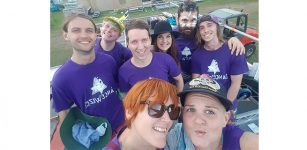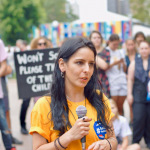Frontline Festival Safety: An Interview With DanceWize NSW’s Jessie Murray

Over the last five months, safety at music festivals has been front and centre. There have been tragic deaths, increased hospitalisations, debates over pill testing, public rallies and an expert panel was convened to investigate the matter.
However, all the while, the DanceWize NSW peer educators have been working at the frontline of events, getting amongst the festivalgoers, and providing them with harm reduction services, including evidence-based information about the harms associated with illicit drug use.
The DanceWize NSW team is comprised of around 150 peer educators that attend festivals throughout NSW whether they be one day events or five day bush doofs. You can pick them out as they roam the crowds in their purple T-shirts emblazoned with a wolf.
In operation since November 2017, the DanceWize NSW program grew out of discussions between the NSW Users and AIDS Association (NUAA) and Harm Reduction Victoria, which has been running a similar and highly successful program for over two decades.
#BeHeardNotHarmed
On Tuesday night, DanceWize NSW and Students for Sensible Drug Policy officially launched Be Heard Not Harmed in this state. The youth-driven campaign is calling on the NSW government to implement pill testing services.
European countries, such as Austria, Spain and Germany have been providing these services since the 1990s. The Netherlands was the first country to try it out back in 1992. And it’s easy to say these countries continue to utilise this harm reduction approach because it works.
Five young Australians have died in drug-related circumstances at music festivals this season. And despite the European experience, NSW premier Gladys Berejiklian refuses to consider the evidence. Indeed, she claims there’s none.
Meanwhile, the ACT government has announced a second pill testing trial will take place at Groovin the Moo in April, as the first one was such a success. Two punters lives were potentially saved that time when they binned their pills after they tested positive to a substance that can prove lethal.
An industry in crisis
The Berejiklian government’s solution to improve safety at events is to implement a new festival specific licensing regime that will potentially cripple the industry. It was recommended by the government’s expert panel on festival safety, with next to no consultation with the industry itself.
And although, it doesn’t officially come into effect until 1 March, the licensing scheme is already having a dire effect. Psyfari cancelled due to excessive red tape, while Mountain Sounds shut down at the last minute citing an exorbitant user pays policing bill.
Frontline harm reduction
Jessie Murray is one of the DanceWize NSW coordinators. She’s a decade-old veteran of the festival circuit, with a passion for community and arts-focused events. And Murray also has a focus on evidence-based approaches that improve the safety of punters.
Sydney Criminal Lawyers spoke to Jessie Murray about the role peer educators play at events, why harm reduction is the most effective approach to take when it comes to illicit substances and she dispels some of the myths surrounding the current debate about the new licensing regime.
So, firstly, Jessie, why pill testing?
Pill testing is one of the easier ways to engage a group of people who intend to take drugs that are otherwise difficult to engage and discuss harm reduction tactics with. And it’s got twenty years’ worth of evidence all over the world.
We know that it works. We know that it prevents harm through engagement and informing through knowledge, so people make informed decisions concerning drug use.
Evidence tells us that once festivalgoers gain top-notch information and education on drugs and drug use, the more likely they are to not take the drugs at all, in fact evidence-based knowledge actually dissuades people from taking drugs in the first place.
Five people have died this festival season in NSW as a result of having taken illicit substances at events. There are strong calls from health professionals and the wider community to implement pill testing.
However, Gladys Berejiklian refuses to consider this harm reduction approach. What do you think about the NSW government’s outright refusal to look at the evidence?
It’s a little confusing, to be honest. If implemented, pill testing could be offered as part of an extensive suite of harm reduction approaches which would not only improve health outcomes across any measure you wish to examine, but would have outstanding cost benefit return.
It’s unwise to ignore the evidence. It’s makes no sense to ignore the call from doctors and chemists. We haven’t tried this regimen other than the one trial in Canberra last year. And therefore, we can’t possibly say that it doesn’t work, especially when we know what occurred in Canberra at Groovin the Moo. It’s like, kind of absurd really.
As is usually the case, most politicians won’t take the realistic or evidence-based approach if it means losing votes and their re-election chances. They’re afraid that this means they’re condoning drug use.
But, harm reduction does not promote drug use. It accepts that people use drugs despite legal prohibition. It takes the head out of the sand and talks to them in a way that’s really pragmatic and honest. And it applies real life valuable information into a situation that is otherwise potentially unmanageable.
The fact is it’s currently unmanageable. People will take drugs. And telling them not to – the “just say no” approach – is not going to stop them.
So, DanceWize is a team of mainly volunteers that provide peer education and harm reduction services at festivals. Can you outline what that entails?
We have three main functions at a festival. And they are as follows:
We have a private care space, which is always located next to medical. This is supposed to look after people who are feeling distressed and overwhelmed. If they’ve been bullied or intimidated. If they’re feeling a little bit out of it, but it’s not a medical emergency. We take care of people’s psychological health on site.
Then we have a front of house education space. So, this is open to the public. Anyone can come and get some education about drug combinations, drug types, and particular drugs that are toxic and deadly.
There are referrals services for treatment or support education. There is family drug health support. We’ve got referral services for sexual assault and queer members of the community.
Basically, we’re a health outreach program and we help link people with the information and the resources that they need to live a happier, healthier life.
And then our third part of the program is our roving service. So, we have teams of rovers always circulating throughout a festival – on a dancefloor or elsewhere – handing out things like electrolytes or fruit or further resources. And letting people know that we are there.
If people can’t find us or are unable to come to us for whatever reason, then our rovers can go to them and help escort them back to a safe place.
And what sort of training are DanceWize peer educators equipped with?
There’s a range of training modules that we ask them to do. There are approximately twelve different modules at the moment. They do an induction training with us as their first port of call. They do their first aid and CPR training as basic prerequisites.
And after that the modules that they do are psychopharmacology, legal training, responding with compassion to sexual assault, blood-borne viruses, needle and syringe program training, and trip sitting: how to look after someone who is experiencing a psychological or psychedelic crisis.
We are also doing diplomacy, de-escalation training and mental health and self-care training.
You’re on the ground at events carrying out this work yourself. What would you say are some of the trickier situations that you’ve had to deal with?
Some of the tricky situations tend to happen in forty-degree heat, because no matter if somebody is sober or under the influence, the heat level increases the risk for anyone.
And we’ve had a heatwave this summer. Almost every festival has been in the high thirties or the early forties.
The tricky part of this situation is that most people start an event dehydrated, overwhelmed and with too much stimulation. This is before even imbibing alcohol or a drug. So, by the time they do, they find themselves in a really difficult situation. And we find multiple presentations.
The heat and the lack of shade or an increased security or police presence, leads people to take less self-care, strangely enough. So, we often see multiple people at a time and get inundated with these sorts of care cases at festivals with extreme heat.
But, we’ve dealt with anything from seizures, through to people getting drugged by other people on the dancefloor, through to rape and sexual assault.
We’ve dealt with some really difficult situations. And our team are absolutely amazing and professional in their approach to helping.
Festivals have come under the spotlight this season. And one thing that has emerged is that there’s been saturation policing at certain events.
What sort of an effect do you think the over-policing of events has?
We need to work together with police, security and medical to look at the ideal health outcomes for the community. It’s really difficult to do that sometimes when the focus is only on the criminalisation aspect.
What I’ve found is that the more police there are, the more fear there is on behalf of the patrons. There’s less willingness to talk about their behaviours and their habits. There’s a lot more discrimination and stigma.
And these things lead to ignorance and dangerous risk-taking behaviour. And basically, the more police we have around, particularly around the medical tent and the health tent, the less likely people are to go and ask for help.
Because they’re scared that if they do, they’ll get in trouble with the police. And often that’s what’s happening, which is downright dangerous.
This is something that we are working closely with police to try and improve. And many of our relationships are quite positive.
But, they have their jobs to do. And at the moment illicit drugs are illegal, so they’re doing everything they can to stop people bringing them in. But, I don’t think it’s effective at all.
In response to the drug-related deaths at festivals, the Berejiklian government is about to implement an overbearing festival specific licensing scheme, which will involve Liquor and Gaming NSW having control over events and exorbitant user pays policing bills.
What sort of effect do you think this licensing regime is going to have on the industry?
I’m concerned about the impact that these changes are going to have as well. Particularly, because there seems to be a disproportionate risk allocated to camping events and community events.
And those risks might not apply to other events. That isn’t a level playing field because it lacks consistency. There doesn’t seem to be rhyme or reason to the risk assessment and the regulations that are coming out.
I don’t believe there has been adequate communication with those in the industry – the directors of these festivals – to determine the best approach. Bringing these things in before consulting with everybody that’s involved is unwise.
It will push people out of the state. We’ve already seen several festivals close down or move location, because they can’t afford to operate in NSW with these new guidelines.
I agree safety should be of the upmost importance. But, anybody who goes to these events, and anyone who works at them, understands the lengths that promoters go to already to maintain health and safety.
The police have already admitted that they can’t keep drugs out of prisons and festivals. I don’t really understand how it’s up to the event manager to do that if the police can’t.
Another misconception is that these events make a lot of money. And therefore, they have the extra money to pay for user pays policing and pay for extra medical staff. But, they don’t.
Most festivals run at a loss for the first ten years. And the people putting their time and energy into it don’t get paid. They take their annual leave to provide these community events.
So, the misunderstanding that event promoters are making a quick buck or getting away with a lot of money is plain wrong. Most of these people don’t have any money and they’re doing it for the love of it.
Most festivals have a yearly function. And if you bring in these things a week, two weeks or a month before their festival, there is no time to gather that money or increase ticket prices or to make the changes necessary to allow these measures are put in place.
All that’s going to happen is the festival will fold because they can’t afford it. And now it’s a regulation, if they can’t afford to pay those policing fees or the medical fees, because it’s such short notice, then they can’t go ahead.
Basically, the long-term impact of that is there’s so many musicians and technicians who are going without work. And this is not just 18-year-olds working in a bar, who miss a shift. It’s people who have built their entire career on this industry, which in this state is already being massively affected.
I know people who have just had children and have been working for ten years to try to get a living wage out of this work. They’ve finally gotten there, and the last six months has been devastating for their work. And they can’t just go into an ordinary industry with those skills. It’s very specific.
I’m concerned that people have made these decisions, with some input, but not the right input. And took too quick a timeline to be able to effectively put them in place. It’s a bit of a kneejerk reaction.
And lastly, Jessie, Gladys Berejiklian’s approach to drug use at music festivals is to “just say no”. What would you say the DanceWize NSW approach is?
We say just say know. We believe that the just say no campaign has been an absolute failure.
Anyone with teenagers understands that if you tell the young demographic not to do something that it doesn’t work. It increases their desire to do it and when they do it, they realise that not all drugs kill. Then everything you’ve told them is disingenuous and they don’t trust you.
What we do is we understand youth psychology. We teach them what the harms and risk inherent in drug use are. And particularly, polydrug use and that includes alcohol.
And then we trust that they’re going to make a healthy decision for themselves. They’re adults. They vote and drive. They are compliant, legal, working adults. They can make healthy decisions for themselves.
The misconception is that kids don’t get it. And kids are putting themselves at harm’s way. So, we see certain politicians pulling their hair out saying, “It’s so sad. Kids are dying. I don’t get it.”
But, they’re not actually understanding the psychology of young people, which is that they don’t like being lied to. They don’t like being obfuscated. They want the truth. They try to get to the bottom of the matter. And so, we give them evidence based on science.
We are there for them when things go pear-shaped. We don’t judge them. And we don’t discriminate against what drug they’ve used, what help they need or what their experience has been. We help, full stop.
We just support them. And though it might sound counterintuitive, we’ve had many young people write to us and say, “Thank you for the advice. I want to let you know that I decided not to use those drugs, because of the information you gave me.”
Some politicians may think that we’re condoning drug use, the actual impact is the opposite. And that’s what I’m interested in – the healthy outcomes.







